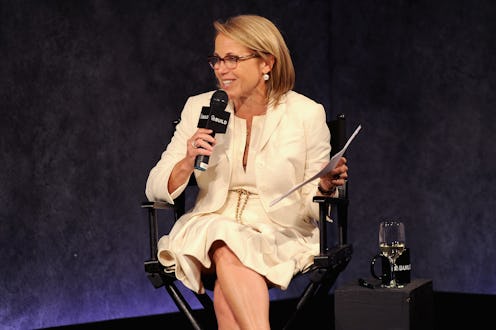Entertainment
How Katie Couric Fights Sexism In The Workplace
When you put four of TV and film's most influential women in a room together, the girl power vibes are real. Yet that doesn't only mean cheering each other on and bonding over a shared love of wine — in the case of iconic news anchor Katie Couric, Girls' co-creator Jenni Konner, Ghostbusters ' screenwriter Katie Dippold, and Broad City producer Lucia Aniello, it also means swapping stories about the sexism they've all experienced in and out of the workplace. When I spoke to the four women prior to AOL Build + Makers' recent "Celebrating Women Creators" panel, they shared an understanding that sexist behavior is rampant in the world of media — but they also gave one major tip for making that culture a more equal place for women.
"I think that the key is to get women in powerful positions and to have those women be supportive of other women and to help bring them along, because as long as we have mostly men making the decisions, the decisions are gonna not necessarily support women unless you have some enlightened men," says Couric. "Women need to rise through the ranks, and once they’re making the decisions, I think you get a very different compliment of people, and I think women are hopefully more open to diverse voices."
Adds Konner, "At the beginning of my career, I was just glad to be invited to the table and OK being the only woman, or one of two, in the room. And now, being in a position of power where I can hire people, I just say to everyone, 'hire more women.'"
This sentiment couldn't matter more in an industry in which, according to recent studies by the Center for the Study of Women in Television and Film, only 19 percent of all directors, writers, producers, executive producers, editors, and cinematographers on the top 250 grossing films of 2015 were women, and in which just 27 percent of creators, directors, writers, producers, executive producers, editors, and directors of photography in the 2014-2015 television season were women. In order for female representation both on- and off-screen to improve, it's crucial for women already in positions of power to make the effort to hire more ladies capable of helping change the conversations. That said, it's not as simple as hoping more talented women decide to apply for jobs, Konner says — if you're a female exec in a powerful position, you have to be the one to make sure that they get into the room in the first place.
"You just have to ask for women and tell agents you want to meet women, and they will get them, and if they don’t have them, you’ll go to another agency and find them," Konner explains. "It’s the same thing with diversity — you just make it a mandate and you have to push the ball forward for women. it’s the very least we can do, being in the position we’re in."
Yet even when more women are in the room, that doesn't mean sexism simply disappears. Aniello, who directs, produces, and writes for Broad City, one of the most feminist shows on TV, says that she's heard plenty of gender-based criticism for her show, but chooses to ignore it. "I tend to just concentrate on — especially because I only do comedy — just thinking about what is the funniest thing, and then we just happen to have women doing it," she explains. "So it’s just what it is, and I feel like with that kind of criticism, it's about, 'hey, is it funny first?' And if you laughed, then you kind of don’t get to criticize it beyond that."
Dippold, who's a lightning rod for sexist criticism right now due to the much-talked-about Ghostbusters finally hitting theaters, agrees. "The number one thing for me has always just been focusing on the work," she says. "Because I can get distracted really easily by the negative backlash or anything ego-related, but when I can just put all that energy into writing, that’s been very helpful for me."
And while all four women acknowledge that the (in Couric's words) "pervasive insidious sexism" that's so present in the workforce isn't going away anytime soon, advice like Dippold's is extremely helpful for ladies wanting to spend their time making good work, not fighting sexist trolls. But if that doesn't work, Couric says, "Money talks" — and so supporting female-led projects like Ghostbusters, Girls, and Broad City are key to making sure that more stories on-screen are told about women, by women, and made in a landscape where women are treated equal to their male peers.
